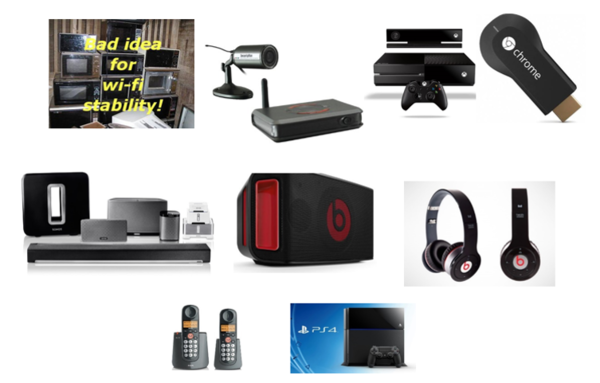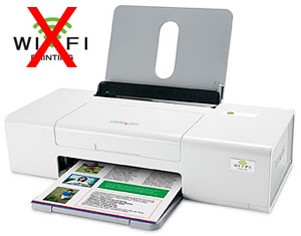Difference between revisions of "Optimize your residence hall Wi-Fi connection"
| Line 2: | Line 2: | ||
==About this article== | ==About this article== | ||
| − | This article provides instructions for optimizing the performance of campus | + | This article provides instructions for optimizing the performance of campus WiFi in WSU residence hall rooms. It is intended for all students living in WSU residence halls who are experiencing a weak WiFi signal, slow network performance when connected to campus WiFi, or interruptions in wireless connectivity. |
| − | ==Troubleshooting | + | ==Troubleshooting WiFi issues== |
| − | Using | + | Using WiFi is convenient, but unlike other types of data connections, there are more things to consider if it isn’t working well. Unlike a wired connection, WiFi is a shared resource. Everyone using it plays a role in making everyone else’s experience better or worse. All residence hall common areas and most rooms at WSU are covered by the Warrior wireless service. If your computer sees the Warrior network but the signal strength is not strong enough to provide a consistent signal, here are troubleshooting steps to follow: |
===Restart your computer=== | ===Restart your computer=== | ||
| − | If you experience problems connecting to | + | If you experience problems connecting to WiFi right after disconnecting from wired connection or when returning to your room after being connected at other locations on campus or off, try restarting your machine. This will renew your IP address and reconnect your computer to the nearest WiFi access point. |
===Look for sources of potential interference=== | ===Look for sources of potential interference=== | ||
| − | Older microwave ovens, new Internet TVs, cordless phones, Bluetooth devices, wireless speaker systems, wireless cameras (very likely to cause problems), Chromecast , or wireless game controllers can, and frequently do in densely packed residence halls, interfere with your ability to establish and maintain a consistent | + | Older microwave ovens, new Internet TVs, cordless phones, Bluetooth devices, wireless speaker systems, wireless cameras (very likely to cause problems), Chromecast , or wireless game controllers can, and frequently do in densely packed residence halls, interfere with your ability to establish and maintain a consistent WiFi connection. Older microwaves are particularly prone to cause interference, reducing Wi Fi performance and sometimes knocking everyone off nearby WiFi access points while running. |
[[File:wifi_issues-appliances1.png|600px]] | [[File:wifi_issues-appliances1.png|600px]] | ||
| Line 18: | Line 18: | ||
===Disable wireless devices when not in use=== | ===Disable wireless devices when not in use=== | ||
====Printers==== | ====Printers==== | ||
| − | Many new printers have the ability to connect to a | + | Many new printers have the ability to connect to a WiFi network and this feature is enabled by default. Given that you are not able to attach most of these printers to the Warrior wireless network, you might as well disable that printer feature and free up the wireless bandwidth it uses. Consult your owner's manual for instructions. This feature can be enabled again as needed. |
[[File:No_Wireless_Printer.jpg]] | [[File:No_Wireless_Printer.jpg]] | ||
| Line 28: | Line 28: | ||
===Disable personal wireless access points=== | ===Disable personal wireless access points=== | ||
| − | WSU prohibits the installation and use of personal | + | WSU prohibits the installation and use of personal WiFi access points in campus residence halls. This includes cell phone hot spots. The use of such services will interfere with campus WiFi performance. |
===Are there wireless weak spots in your room?=== | ===Are there wireless weak spots in your room?=== | ||
| − | Is there one area of your room where the campus | + | Is there one area of your room where the campus WiFi signal seems stronger than in other areas? If so, is this consistent across various times of day? When you notice the signal strength dropping, is there some activity that always seems to be happening (e.g., your roommate is having six of his/her friends over and they are all using the wireless network, etc.)? It's possible that this is caused by temporary interference, but it could also be due to the position of the nearest wireless access point. This is good information to pass along to the Technical Support Center if you need help. |
===Are you having trouble with wireless performance in other areas of campus?=== | ===Are you having trouble with wireless performance in other areas of campus?=== | ||
Revision as of 14:23, 28 March 2018
About this article
This article provides instructions for optimizing the performance of campus WiFi in WSU residence hall rooms. It is intended for all students living in WSU residence halls who are experiencing a weak WiFi signal, slow network performance when connected to campus WiFi, or interruptions in wireless connectivity.
Troubleshooting WiFi issues
Using WiFi is convenient, but unlike other types of data connections, there are more things to consider if it isn’t working well. Unlike a wired connection, WiFi is a shared resource. Everyone using it plays a role in making everyone else’s experience better or worse. All residence hall common areas and most rooms at WSU are covered by the Warrior wireless service. If your computer sees the Warrior network but the signal strength is not strong enough to provide a consistent signal, here are troubleshooting steps to follow:
Restart your computer
If you experience problems connecting to WiFi right after disconnecting from wired connection or when returning to your room after being connected at other locations on campus or off, try restarting your machine. This will renew your IP address and reconnect your computer to the nearest WiFi access point.
Look for sources of potential interference
Older microwave ovens, new Internet TVs, cordless phones, Bluetooth devices, wireless speaker systems, wireless cameras (very likely to cause problems), Chromecast , or wireless game controllers can, and frequently do in densely packed residence halls, interfere with your ability to establish and maintain a consistent WiFi connection. Older microwaves are particularly prone to cause interference, reducing Wi Fi performance and sometimes knocking everyone off nearby WiFi access points while running.
Disable wireless devices when not in use
Printers
Many new printers have the ability to connect to a WiFi network and this feature is enabled by default. Given that you are not able to attach most of these printers to the Warrior wireless network, you might as well disable that printer feature and free up the wireless bandwidth it uses. Consult your owner's manual for instructions. This feature can be enabled again as needed.
Other devices
If you go to class and leave your laptop or tablet on in your room, you aren’t just wasting electricity, you are occupying a wireless channel needlessly. Just put your devices to sleep and wake them up again when you get back.
Disable personal wireless access points
WSU prohibits the installation and use of personal WiFi access points in campus residence halls. This includes cell phone hot spots. The use of such services will interfere with campus WiFi performance.
Are there wireless weak spots in your room?
Is there one area of your room where the campus WiFi signal seems stronger than in other areas? If so, is this consistent across various times of day? When you notice the signal strength dropping, is there some activity that always seems to be happening (e.g., your roommate is having six of his/her friends over and they are all using the wireless network, etc.)? It's possible that this is caused by temporary interference, but it could also be due to the position of the nearest wireless access point. This is good information to pass along to the Technical Support Center if you need help.
Are you having trouble with wireless performance in other areas of campus?
If so, there may be a problem with your device's wireless card. Contact the Technical Support Center (TechSupport@winona.edu, 507-457-5240, Somsen Hall 207).
What do I do next?
Please follow these steps before contacting the Technical Support Center:
- See if others around you can still connect to Warrior. If they can, and you are the only one having the problem, then you know it is something related to your device. If everyone cannot connect, then someone (not everyone) needs to contact the Technical Support Center. In that case, be sure to note that the entire hall or floor cannot connect, as that will facilitate troubleshooting.
- Try repairing your wireless connection. In Windows, this is as easy as bringing up your Network Connections and selecting the Repair option on your wireless connection. For Macs, you can turn Airport off and then on again. This has the effect of causing your wireless connection to reset, and this can “clear the cobwebs” of a stale connection with bad cached data.
- See if you can connect somewhere other than your room. If you can connect in the common areas and other places but not your room, this will greatly facilitate troubleshooting. If you still cannot connect in your room after repairing your connection, but you can connect in other buildings or common areas in your residence hall, please let the Technical Support Center know that when you request assistance.
How do I contact the Technical Support Center?
If you have checked each of these troubleshooting points and the signal strength continues to be weak, the Technical Support Center wants to know about your findings. Please call or email the Technical Support Center (TechSupport@winona.edu, 507-457-5240, Somsen Hall 207) and let us know the details of your findings. We will dispatch a technician to investigate the problem.


